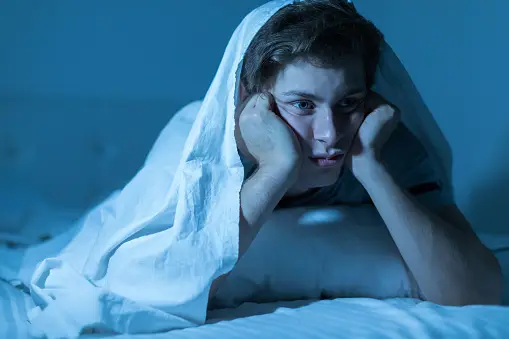Tossing, turning, and thoughts racing—sound familiar?
Imagine lying in bed, trying to fall asleep, but anxiety has its grip on you.
In this post, let's uncover everything about anxiety while sleeping and discover how to bring tranquility back to your sleep.
Let’s dive right in!
What is Anxiety While Sleeping?
Ever felt like your thoughts are on overdrive just as you're about to sleep?
That's anxiety while sleeping.
Here is a proper definition!
Anxiety while sleeping refers to the experience of feeling anxious, stressed, or worried when trying to fall asleep or during the night. It can cause racing thoughts, restlessness, and difficulty achieving restful sleep.
It's like a parade of thoughts marching through your mind just when you should be drifting into dreamland.

Causes of Anxiety While Sleeping
Why does this happen?
Well, life throws curveballs, and sometimes they keep spinning even when you're trying to rest.
Here are some common culprits:
- Stress: Worries from the day sneak into your mind at night.
- Overthinking: Your brain goes into hyperdrive, replaying events and creating scenarios.
- Daily Challenges: Life's ups and downs become bedtime companions.
- Work Pressure: Job stress can linger long after the office lights are off.
- Personal Concerns: Family, relationships, and future plans—sometimes they crowd your mind when it's time to sleep.
Can you relate to feeling like your brain won't shut off at bedtime?
It's like having a late-night brainstorming session you didn't sign up for.
The Impact of Sleep Quality on Mental Health
Sleep is your body's way of recharging, but anxiety while sleeping throws a wrench into the process.
Here's what happens:
- Fatigue: Tossing and turning leaves you tired the next day.
- Irritability: Lack of sleep can make even the small things feel like a big deal.
- Foggy Mind: Your brain doesn't function at its best when sleep is disrupted.
- Emotional Well-being: Anxiety at night can make you feel down during the day.
Imagine this: You've spent the night staring at the ceiling, and the next day you're exhausted.
Your patience wears thin, and even a friendly “good morning” feels like an annoyance.
It's like your sleep struggles are spilling into your day.

Strategies for Managing Anxiety While Sleeping
Pre-Bedtime Preparation:
Getting ready for bed doesn't have to be a mundane routine. It can be a soothing ritual that signals your body and mind it's time to wind down.
Dim the Lights: Lower the lights in your surroundings to signal your brain that it's time to relax.
Mindfulness and Relaxation Techniques:
Remember the “deep breaths” advice?
It works wonders when it comes to easing anxiety.
- Deep Breathing: Take slow, deep breaths to calm your nervous system.
- Progressive Muscle Relaxation: Try to tense and relax each muscle group, starting from the toes and working your way up.
- Guided Imagery: Visualize a peaceful scene, like a calm beach or a serene forest.
Journaling and Worries Release:
Ever tried writing down your thoughts?
It's like giving your mind permission to let go.
Worry Journal: Jot down your worries and thoughts before bed. They're now on paper, not in your head.
Bedside Journal: Keep a journal by your bedside. If you wake up with worries, jot them down to clear your mind.
Limit Screen Time Before Bed:
Those screens are sneaky—they mess with your sleep. Here's how to outsmart them:
Tech Timeout: Put your phone, tablet, and laptop away at least an hour before bed. No more scrolling through social media!
Read a Book: Instead of scrolling, read a calming book to help unwind.

Creating a Comfortable Sleep Environment:
Your sleep space matters. It's where you recharge, after all.
- Cozy Bedding: Choose comfy pillows and blankets that invite you to relax.
- Temperature Control: Adjust your room temperature to make it comfortable for sleeping.
- Clutter-Free Zone: A tidy space equals a tidy mind. Keep your sleep area clutter-free.
Seeking Professional Help
If anxiety while sleeping becomes a nightly visitor, it's time to call in the professionals.
Think of them as your sleep superheroes.
Therapists and Counselors: They're like guides through the nighttime maze of worries.
Medical Professionals: If needed, they can suggest medications or treatments to improve sleep quality.
Key Takeaway: A Good Night's Rest Awaits
You deserve sleep that refreshes and rejuvenates.
Don't let anxiety steal your peaceful nights.
With simple strategies, a little mindfulness, and the possibility of seeking help, you can turn those sleepless nights into peaceful ones.
Frequently Asked Questions
How is anxiety while sleeping different from general anxiety?
General anxiety refers to persistent worry and fear that affects daily life. In contrast, anxiety while sleeping specifically involves experiencing anxiety during the nighttime hours, often interfering with falling asleep or staying asleep.
What are the common causes of anxiety while sleeping?
Anxiety while sleeping can be triggered by various factors, including stress, overthinking, work-related pressures, personal concerns, and challenges faced during the day. These thoughts and worries can surface when the mind is least distracted.
How does anxiety while sleeping impact sleep quality and mental health?
Anxiety while sleeping can disrupt sleep patterns, leading to fatigue, irritability, decreased cognitive function, and emotional instability during the day. Over time, untreated anxiety during sleep can negatively affect overall mental well-being.
Can I manage anxiety while sleeping alone or seek professional help?
While self-help strategies can be effective, seeking professional help is advisable if anxiety while sleeping persists or significantly affects your well-being. Therapists, counselors, and medical professionals can provide guidance, support, and treatment options tailored to your needs.
How can mindfulness help alleviate anxiety while sleeping?
Mindfulness involves staying present at the moment and can be practiced through techniques like deep breathing and guided imagery. Mindfulness helps redirect the mind from anxious thoughts, promoting relaxation and better sleep.
Is it normal to experience anxiety while sleeping occasionally?
Occasional anxiety bouts while sleeping can be normal, especially during stress or significant life changes.
However, it's worth addressing if it becomes a recurring pattern and interferes with your sleep regularly.
Can improving my sleep environment really help with anxiety while sleeping?
Creating a comfortable sleep environment can positively impact your sleep quality. Adjusting lighting, reducing clutter, and maintaining a comfortable temperature can create a calming atmosphere that promotes relaxation and better sleep.
When should I seek professional help for anxiety while sleeping? If anxiety while sleeping becomes a persistent issue that affects your daily life, seeking professional help is a good idea. Therapists, counselors, and medical professionals can provide guidance and support, and, if necessary, recommend treatments or medications to improve your sleep quality and mental well-being.
Can anxiety while sleeping be eliminated entirely?
While it might not be eliminated entirely for everyone, the goal is to manage and reduce the impact of anxiety while sleeping. With the right strategies, support, and mindfulness practices, you can improve your sleep quality and minimize the disruptive effects of anxiety.


